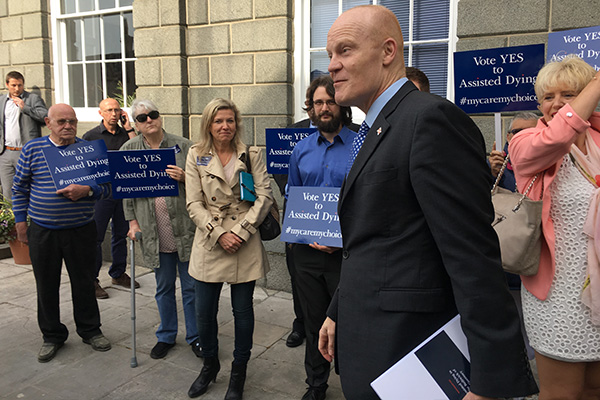


While Jersey, the Isle of Man and Scotland are poised to implement assisted dying legislation for terminally ill patients, some fear that Guernsey will again be playing second fiddle on major policy issues.
Guernsey generated headlines in the national media when a group of seven deputies, including the then Chief Minister Deputy Gavin St Pier, forced a States debate on the issue in 2018.
But that attempt for legalisation was ultimately defeated by 24 votes to 14.
In the meantime, public support for reform has grown elsewhere, with governments now actively exploring options to improve choice, access, and control for those who suffer an awful and irreparable quality of life – and not just in the British Isles.
A recent citizens assembly vote in France showed strong support for reform. Indeed, President Emmanuel Macron has not shied away from allowing a national debate to occur and now seems likely to support law changes as soon as the end of this year.
Jersey is currently engaged in an advanced public consultation after a citizen jury and the legislature overwhelmingly approved the principle of assisted dying in 2022. It has just extended the feedback publication date to April 2023.
Ethics boards in western countries are also becoming increasingly concerned that end-of-life care is not being taken seriously enough, with patients being denied dignity in their final chapter.
There is little appetite within Guernsey’s senior political committee to confront the issue, which attempted to deprioritise a related review only to have it wrestled back onto the agenda by deputies. That should be undertaken before 2025, although nothing has been publicly raised so far.

Pictured: Jersey made history last year, becoming the first government in the British Isles to agree to assisted dying in principle.
Speaking to Express, Deputy St Pier lamented the missed opportunity, saying “we had a chance to lead but, once again, we will end up following”.
He claims a referendum may be the best route for Guernsey to travel down, noting similar a exercise in New Zealand which highlighted widespread support for better end of life options
“We not only risk falling behind France and Jersey but also Spain and Portugal who are also moving forward. In the last five years, all the Australian states and New Zealand have moved ahead with safe regimes for the terminally ill,” he said.
Part of the issue is hypocrisy for Deputy St Pier. He criticises what he sees as a quasi-form of assisted dying currently being exercised, but without the freedom of the individual to choose.
“Our current law is unsafe. It encourages those who are desperate to take or attempt to take their own lives. And the medical use of high doses of pain relief at the end of life is acceptable even if it has a double effect of hastening death.
“In practice, therefore, deaths are often assisted in their final stages but in a way that takes control away from the individual and places it in the hands of medical staff.”
Despite polling which showed strong support for more end-of-life choices, Deputy St Pier believes our local legislature is not prepared to act this term, with stiff opposition sat on the Assembly benches.
“Sadly, there is little apparent appetite in this current Assembly to listen to the public and give them what they want,” he said. “Cruelly for those desperately wanting more individual control, it’s even been described as a ‘vanity project.’
“The opposition here and elsewhere is as strong as ever and it becomes more vociferous as the prospect of change increases. Ironically, it is often those who profess to be supporters of personal freedom and liberty, who prove to be the most illiberal on this. The strongest opposition typically comes from faith-based groups."

Pictured: There was vocal public support when Deputy St Pier unsuccessfully attempted to persuade lawmakers to back reforms.
2021 polling indicated two thirds support for legalisling assisted dying across the Crown Dependencies.
Deputy St Pier believes the Bailiwick can no longer keep its head in the sand on the issue.
“The community is as supportive as it was five years ago. As other jurisdictions change, the demand for change will grow here. It is inevitable that it will happen - it’s only a question of when.
“I will do what I can whilst in the States to ensure the matter is not forgotten and will work with colleagues who share the aspiration for change.”
Comments
Comments on this story express the views of the commentator only, not Bailiwick Publishing. We are unable to guarantee the accuracy of any of those comments.